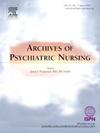拔毛癖患者内化耻感与应对策略关系的研究
IF 2.2
4区 医学
Q1 NURSING
引用次数: 0
摘要
本研究旨在探讨内化污名与拔毛狂(TTM)患者应对策略之间的关系。方法选取34例TTM患者和34例健康对照。治疗组和对照组分别采用社会人口学数据表、贝克抑郁量表(BDI)和修正后的问题应对倾向量表(R-COPE)。此外,TTM组采用马萨诸塞州总医院拔毛量表(MGH-HPS)和精神疾病内化污名量表(ISMI)。结果TTM患者R-COPE自助量表得分显著低于对照组,R-COPE回避和自我惩罚量表得分显著高于对照组。TTM患者的R-COPE适应评分与ismi -歧视体验评分呈负相关。R-COPE回避与ismi总分、刻板印象认同和歧视经验分量表得分呈正相关。R-COPE自我惩罚得分与ismi总分、疏离感和社会退缩得分呈显著正相关。结论TTM组在面对压力源时采用适应不良应对策略的比例高于对照组,且随着内化污名水平的升高,采用适应不良应对态度的比例更高。这些结果表明,TTM患者对自己的障碍的想法和应对态度应引起更多的关注。本文章由计算机程序翻译,如有差异,请以英文原文为准。
Examination of the relationship between internalized stigma and coping strategies in patients with trichotillomania
Background
This study aimed to examine the relationship between internalized stigma and coping strategies in patients with trichotillomania (TTM).
Method
The study included 34 patients with TTM and 34 healthy controls. The Sociodemographic Data Form, Beck Depression Inventory (BDI), and the Revised Coping Orientations to Problems Experienced (R-COPE) were administered to the TTM and control groups. In addition, the Massachusetts General Hospital Hair Pulling Scale (MGH-HPS) and the Internalized Stigma of Mental Illness Scale (ISMI) were administered to the TTM group.
Results
The scores of patients with TTM from the R-COPE self-help subscale were significantly lower than those of the control group, and the scores of the R-COPE avoidance and self-punishment subscales were significantly higher. A negative relationship was found between the R-COPE accommodation scores of patients with TTM and ISMI-discrimination experience scores. A positive relationship was found between R-COPE avoidance and ISMI-total scores, stereotype endorsement, and discrimination experience subscale scores. A positive relationship was found between the R-COPE self-punishment score and ISMI-total score, alienation, and social withdrawal scores.
Conclusion
It was observed that the TTM group used maladaptive coping strategies more in the face of stressors than the control group and that they resorted to maladaptive coping attitudes more as their internalized stigma levels increased. These results show that more attention should be paid to the thoughts and coping attitudes of people with TTM regarding their disorder.
求助全文
通过发布文献求助,成功后即可免费获取论文全文。
去求助
来源期刊
CiteScore
3.70
自引率
0.00%
发文量
131
审稿时长
160 days
期刊介绍:
Archives of Psychiatric Nursing disseminates original, peer-reviewed research that is of interest to psychiatric and mental health care nurses. The field is considered in its broadest perspective, including theory, practice and research applications related to all ages, special populations, settings, and interdisciplinary collaborations in both the public and private sectors. Through critical study, expositions, and review of practice, Archives of Psychiatric Nursing is a medium for clinical scholarship to provide theoretical linkages among diverse areas of practice.

 求助内容:
求助内容: 应助结果提醒方式:
应助结果提醒方式:


